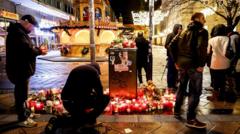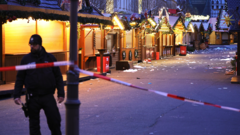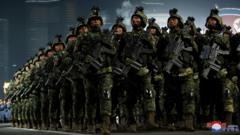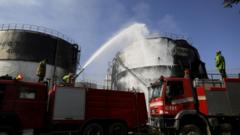On November 17, 2024, Russian forces launched a calculated and extensive assault against Ukraine, targeting the nation’s already strained power grid. Ukrainian officials reported that the aerial bombardment lasted for several hours and involved around 120 missiles and 90 drones, making it the most intense attack in recent months. President Volodymyr Zelensky confirmed that despite Ukrainian air-defense efforts which successfully destroyed over 140 incoming threats, the assault left at least five civilians dead and considerable damage across multiple regions.
Russia's Renewed Assault on Ukraine's Power Grid Raises Concerns for Winter Preparedness

Russia's Renewed Assault on Ukraine's Power Grid Raises Concerns for Winter Preparedness
A significant escalation in aerial attacks on Ukraine's energy infrastructure has resulted in civilian casualties and emergency blackouts as winter approaches.
The attack was characterized by the use of a diverse arsenal, including missiles launched from aircraft, naval vessels, and ground-based platforms, alongside coordinated drone strikes from various angles. This strategic increase in offensive measures from Russia is interpreted by Ukrainian authorities as a clear message from President Vladimir V. Putin rejecting proposals for peace negotiations.
Ukrainian Foreign Minister Andrii Sybiha emphasized the serious nature of the attack, calling it a true reflection of Putin's intentions, and advocated for “peace through strength” rather than giving in to intimidation. In anticipation of potential overloads resulting from the damages, widespread emergency blackouts were initiated.
Casualties reports revealed the loss of two railway workers in the Dnipro region and victims in the port city of Mykolaiv, along with additional injuries from falling debris in Kyiv and a fatal incident in Lviv. As the bombardment persists, the fear of increasing numbers of casualties looms large.
This aggressive escalation follows a period marked by repeated nighttime drone assaults, aimed at overwhelming Ukrainian air defenses and instilling fear within civilian populations, just as winter temperatures begin to drop and energy demands become critical.
Ukrainian Foreign Minister Andrii Sybiha emphasized the serious nature of the attack, calling it a true reflection of Putin's intentions, and advocated for “peace through strength” rather than giving in to intimidation. In anticipation of potential overloads resulting from the damages, widespread emergency blackouts were initiated.
Casualties reports revealed the loss of two railway workers in the Dnipro region and victims in the port city of Mykolaiv, along with additional injuries from falling debris in Kyiv and a fatal incident in Lviv. As the bombardment persists, the fear of increasing numbers of casualties looms large.
This aggressive escalation follows a period marked by repeated nighttime drone assaults, aimed at overwhelming Ukrainian air defenses and instilling fear within civilian populations, just as winter temperatures begin to drop and energy demands become critical.





















